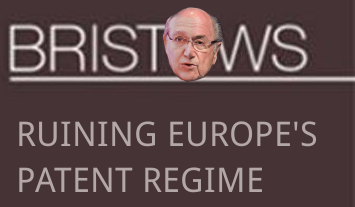

THE lies told by Team UPC are nowadays pathetic. The European Patent Office (EPO) seems more reluctant to lie after António Campinos started his term, so the EPO basically says almost nothing.
"They don't want people to publicly call them "liars" (even implicitly) when they lie. They believe that massively repeating the lies ad infinitum will help these lies stick and thereby shape perceptions. At the same time they attack their critics, albeit only anonymously."An article by Alistair Maughan, Wolfgang Schönig, Sana Ashcroft, Robert Grohmann and Jana Fuchs (Morrison & Foerster LLP) promoted the same old UPC myths earlier this week. UPC was also mentioned here yesterday. They don't seem to care about facts. It's just that same old nonsense about Britain joining something that does not even exist and that it cannot technically join anyway. Team UPC's Wouter Pors wrote about it first thing in the morning; he carries on with the infamous UPC lies (citing as sources other Team UPC fantasists). These 'unitary' patents do not exist and will never exist; they're just fantasies. They're staging a legislative coup for self enrichment and in order to succeed they increasingly attempt to rely on lying to politicians, e.g. Wouter's claim that "if it [UK] does leave the EU, it can still remain part of the UPC, which at least in my view is an honourable cause."
No, it profitable for you, Wouter, it's harmful to the UK, and technically it is not even possible. Deep inside Wouter knows it.
Even though they 'sanitise' comments to remove dissent (to the UPC) from this blog, Concerned observer's first and sole comment soon thereafter appeared (one must remember that these commenters have to be exceedingly polite to not have their comment deleted at the back end). To quote:
Wouter,
With all due respect, I think that the above analysis misses one or two key points.
Firstly, it is important to note that Opinion 1/00 included the following conclusion: “Therefore, the mechanisms for ensuring uniform interpretation of the rules of the ECAA Agreement and for resolving disputes WILL NOT HAVE THE EFFECT OF BINDING THE COMMUNITY and its institutions, in the exercise of their internal powers, to a particular interpretation of the rules of Community law incorporated in the agreement”.
In other words, rulings on provisions of EU law in connection with the ECAA Agreement (in common with rulings of the EFTA Court) would NOT be binding on any EU Member States, and so would not threaten the autonomy of EU law. By way of contrast, the UPC Agreement purports to make rulings of the UPC binding upon the Participating Member States. This is a highly significant difference, meaning that it is IMPOSSIBLE to draw any positive conclusions from Opinion 1/00 (or either of Opinions 1/91 and 1/92) when it comes to the question of compliance of the UPC Agreement with EU law.
Secondly, I do not believe that paragraph 26 of the CJEU’s ruling in Wightman and others has any significance for the UPC. The key part of that paragraph reads as follows: “it is solely for the national court before which the dispute has been brought, and which must assume responsibility for the subsequent judicial decision, to determine in the light of the particular circumstances of the case, both the need for a preliminary ruling in order to enable it to deliver judgment and the relevance of the questions which it submits to the Court”.
In essence, the CJEU is saying that it is up to the national court to determine the need for a preliminary reference under Article 267 TFEU. However, the CJEU’s answer is based upon the undisputed assumption that the national court in question was a “court or tribunal of a Member State” in accordance with Article 267 TFEU. Given that the UK’s future participation in the UPC appears to hinge upon that court being classified an INTERNATIONAL court (ie NOT a “court or tribunal of a Member State”), there is at least a prima facie reason to doubt that the CJEU would accept any preliminary references from the UPC.
In other words, the ruling of the CJEU in Wightman and others simply does not address the key point of contention for the UPC.
One final point: the combination of the above two points could well provide reason to doubt Prof. Tilmann’s assertion that the UK’s loss of EU membership is not a fundamental change of circumstances within the meaning of Article 62 VCLT. This is because a potential consequence of that change is the conversion of the UPC to the status of an international court, the rulings of which could then threaten the supremacy and autonomy of EU law. Thus, whilst it is clear that the CJEU is prepared to entertain arguments based upon the VCLT, I do not believe that this would be the end of the matter for the UPC.